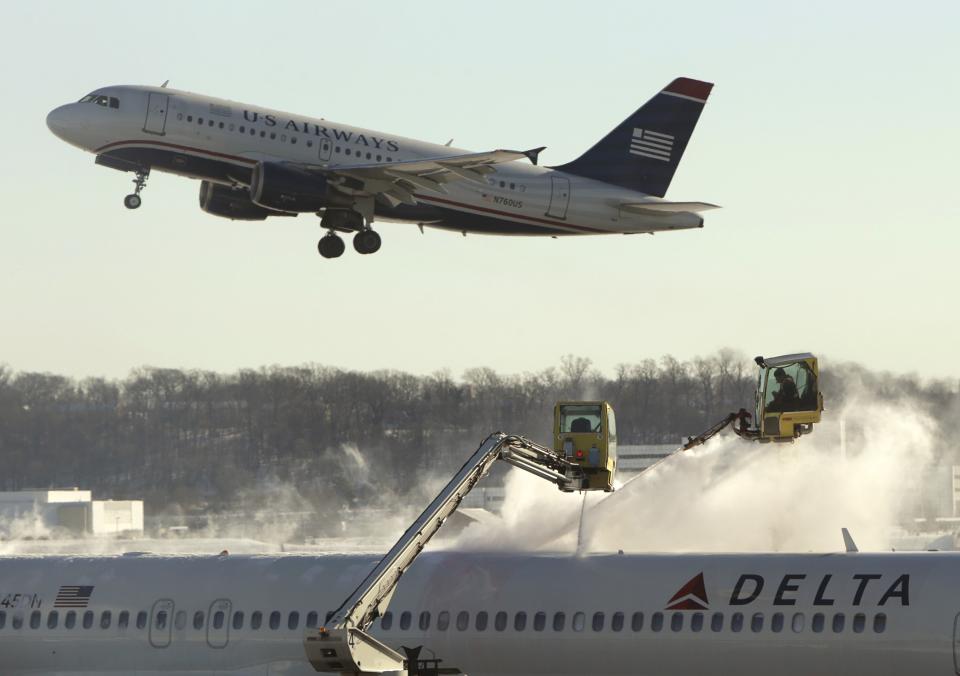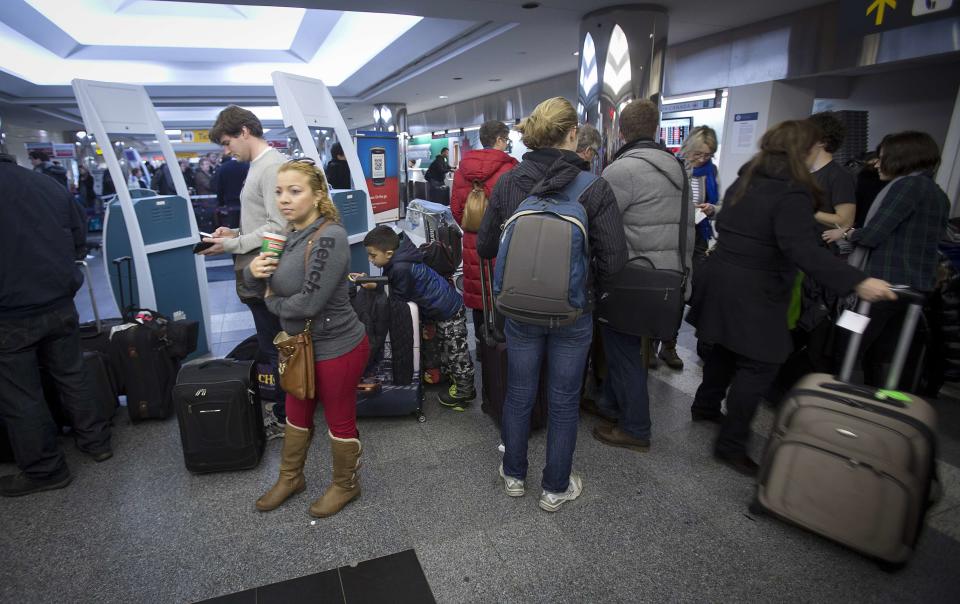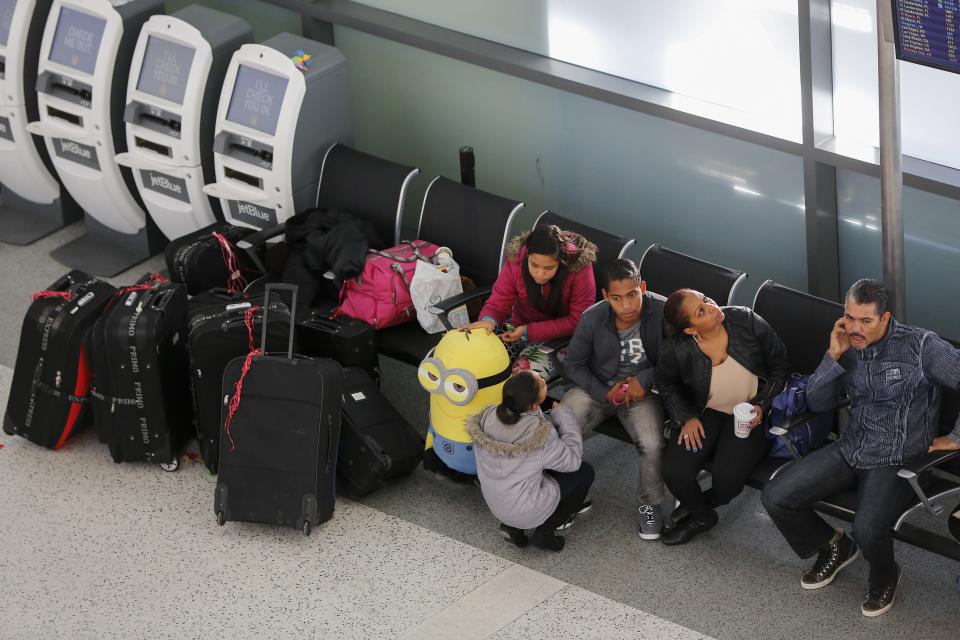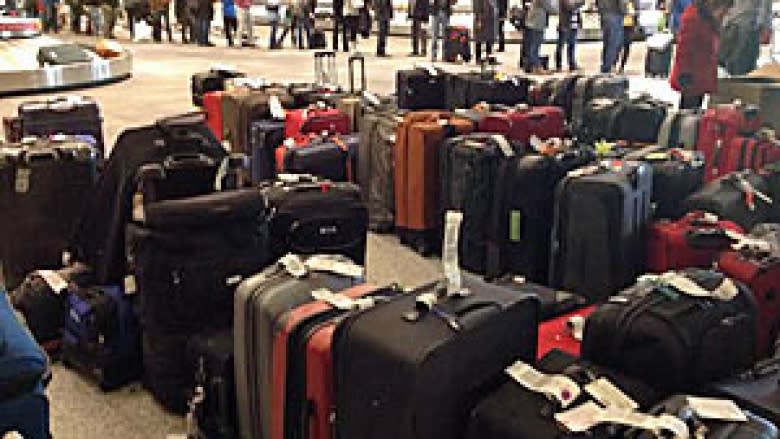Weather woes wreak havoc on air travel across country
The relentless extreme weather conditions in much of Canada caused flight delays and cancellations across the country Tuesday and generally wreaked havoc on air, road and other forms of travel.
A so-called ground stop at Pearson International Airport in Toronto, where temperatures dropped to –35 C to –40 C with the wind chill overnight, halted nearly all North American arrivals for several hours in the morning.
The ground stop was lifted at around 10 a.m. ET, but travellers faced long lineups and delays for hours afterwards, with officials saying it could take several days to fully clear the backlogs.
About 200 flights were cancelled and many departing flights were delayed.
The ground stop, also called a ground freeze, was put in place because of the extreme cold's impact on equipment and efforts to minimize the time employees had to spend outdoors, said Greater Toronto Airports Authority spokeswoman Shereen Daghstani.
"It was the extreme weather conditions that impacted safe operations and employee safety," she said. "When it comes to refuelling or removing the bags, those need to be done by employees."
The ground stop resulted in a massive backlog of planes waiting for gates to open so passengers and luggage could be offloaded, which in turn resulted in travellers having to wait hours to collect their luggage or reschedule flights.
Thousands of would-be passengers queued inside the terminals of the airport awaiting word of their flight status or simply trying to retrieve their luggage. Hundreds of bags and suitcases were piled up in the airport's baggage claims area, and airline officials said some travellers could be waiting days to get their belongings.
Tensions at Pearson airport were running high, which prompted police to move extra officers into the arrivals and departures areas for crowd control, the CBC's Tony Smyth reported.
Peel regional police said five extra officers were called to the airport around 5:25 a.m. ET to deal with a group of about 300 people at a luggage carousel in Terminal 3.
"[They] were getting very frustrated and irate, because there was a ground freeze and they weren't getting their baggage," said Const. Lilly Fitzpatrick.
Police "helped calm people down, they answered questions, they tried to get the information that the people needed as to when they were going to be getting their baggage," Fitzpatrick said.
Airlines are urging passengers to check their flight status before heading to the airport because of cancellations or delays.
The ground stop in Toronto created a domino effect at other airports in the country.
At Halifax's Stanfield International Airport, most flights slated to leave Tuesday morning were grounded as they were either headed to Toronto or scheduled to stop there en route to destinations farther west. Other passengers had already been stranded at the airport since Friday because of a storm, and Tuesday's problems just exacerbated the delays.
At Montreal's Pierre Elliott Trudeau International Airport, passengers faced lengthy delays Tuesday morning as most flights headed to Toronto and Chicago were cancelled.
Many passengers at Winnipeg's James A. Richardson International Airport were also forced to reschedule their flights because of the delays and cancellations.
In Newfoundland, heavy rain and high temperatures led to flooding in communities across the island.
Rain fell on much of Newfoundland on Tuesday as the mercury shot up to 9 C — after days of frigid temperatures and heavy snowfalls, which plugged many drainage areas that would normally accommodate excess water. Flooding hit the St. John's area and, on the island's south coast, three homes were evacuated when the ice-clogged Grey River overflowed its banks.
All that water is expected to refreeze tonight, raising concerns about road safety.
"Once this freezes over, it's going to be treacherous," said CBC reporter Todd O'Brien as he surveyed water-filled roads in St. John's.
The wet and cold conditions will also put more pressure on the province's beleaguered electrical system, which has struggled to keep the lights on and furnaces running since Thursday. Newfoundland was hit by a power outage that began over the weekend, but most of the households affected had their power restored by Tuesday afternoon.
Officials warned, however, that rotating outages could return during peak demand periods.
Schools, including Memorial University and island-based campuses of the College of the North Atlantic, would remain closed Wednesday for a third day in order to limit the demand on the province's energy grid.
The weather is miserable across much of Canada, with all of southern Ontario and most of the north facing dangerous wind chills ranging from –30 C to –45 C.
"We are looking at bitterly cold temperatures in Ontario, in Quebec," said CBC meteorologist Jay Scotland.
In Iqaluit, winds reached near hurricane levels Tuesday. Wind gusts reached speeds as high as 135 km/h, and sustained winds were blowing at 110 km/h, speeds that are close to those of a Category 1 hurricane, said CBC North meteorologist Christy Climenhaga.
Environment Canada warned residents of South Baffin Island to prepare for "a very violent blizzard" that would unfold between Tuesday and Wednesday and bring "damaging northeasterly winds gusting up to 120 km/h and zero visibility in snow and blowing snow."
In Ontario, strong winds also played a major role in the weather. Some southern areas of the province faced blizzard and snow squall warnings, with forecasters saying strong winds would carry the squalls farther inland and might bring snowfall of up to 15 centimetres while visibility could drop to nil in blizzard conditions.
In Quebec, wind, rain and blizzard warnings were in effect for most of the province. Fewer than 1,000 Hydro-Québec customers remained without power Tuesday afternoon, down from a high of 30,000 on Monday afternoon.
"We're seeing an abnormal start to the winter," Scotland said.
"We really are just over two weeks into the winter. We saw a very cold wrap to fall heading into winter so it feels like winter has been around a lot longer than it has been."
Scotland said most of the country is forecast to return to seasonal temperatures by the weekend.
"So, there is light at the end of the tunnel," he said.
"Unfortunately, another bitterly cold one to get through today for much of the country from the Prairies, Ontario, Quebec, temperatures dropping in Atlantic Canada."





